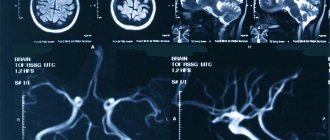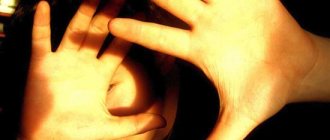Kinds
There are acute and protracted forms of vascular psychoses that arise against the background of existing non-psychotic mental disorders of vascular origin - pseudoneurasthenic manifestations and phenomena of intellectual decline of varying degrees (vascular dementia). However, first it is necessary to mention the symptoms that can serve as harbingers of vascular psychosis: increasing headaches, increasing tinnitus, numbness in certain areas of the face, impaired coordination of movements, dizziness, difficulty falling asleep, unstable mood with tearfulness and irritability (weakness). Speech becomes slurred and incomprehensible. Anxious fears of hypochondriacal content (fear of death or belief in the presence of a fatal disease) may appear. Patients may become more sloppy, gluttonous, and sometimes sexually disinhibited.
Acute form
The acute form is manifested primarily by phenomena of confusion with disorientation in time, surroundings, lack of recognition of others, often psychomotor agitation, influxes of visual and auditory hallucinations (essentially vascular delirium). Most often it develops in the evening or night hours, during the day the consciousness is clear. It usually lasts several hours, after the acute period amnesia develops - patients do not remember what they did during the exacerbation. This condition is prone to recurrence - repeated many times if the patient does not receive the necessary therapy. Very often, the plot of the experience is as follows: the patient believes that he is on a visit (to a hospital, a hotel), and at night he begins to get ready to go home; if the patient is inattentive on the part of his loved ones, he can actually leave home and get lost. Plots of hallucinations often involve meetings with deceased relatives. Additional factors provoking psychosis may be taking certain medications (cardiovascular, sleeping pills, Corvalol or Valocordin, a number of nootropics), fever, sharp fluctuations in blood pressure in any direction, diabetes mellitus. Some authors consider vascular delirium as one of the harbingers of an imminent stroke.
Protracted vascular psychoses
Protracted psychoses can develop as a transition from an acute state, or independently. The transition to protracted psychosis from an acute state can occur through a series of convulsive attacks, through the development of Korsakov psychosis with severe memory impairment (inability to record what is happening, replacement of memory loss with false memories), confusion, through the development of a pseudoparalytic state with carelessness, foolishness, ridiculous actions and ideas of grandeur or through severe asthenia (neuropsychic exhaustion).
Prolonged vascular psychoses most often occur as various variants of hallucinatory-delusional syndrome, that is, the main content of painful experiences is hallucinations and associated delusional ideas (false statements that cannot be dissuaded). Less often, they occur in the form of depression at a psychotic level (with or without anxiety) - patients feel deep sinfulness, for which there is no forgiveness, or a feeling that they have actually died and their body has already begun to decompose (Cotard's delirium). With various forms of vascular lesions of the brain, patients experience various additional symptoms.
Differential diagnosis
The initial period of the process of vascular pathology has signs that resemble neurasthenic and neuropathic diseases. When diagnosing, the doctor relies on the somatics of arteriosclerotic sigma or the symptoms of hypertension (detects changes in the fundus of the eye, determines scattered microsymptoms of a neurological type).
The greatest difficulty is distinguishing senile dementia from vascular dementia. In this variant, the distinctive feature is considered to be the flickering of symptomatic signs of vascular processes with periods of recovery, followed by sharp changes in mental functions, and senile dementia constantly progresses without visible periods of stabilization. Also, vascular disorders have an acute manifestation at the onset of the disease with the presence of a nocturnal increase in undulation of consciousness.
Symptoms
With hypertension, there is always (even without psychosis) increased irritability at the slightest provocation, loss of self-control, self-criticism, and sense of humor. Previously ineffective stimuli (the noise of cars outside the window, the smell of cooking food, things that are not properly placed) cause intense discomfort. Mental fatigue and exhaustion increase; patients are unable to carry on a long conversation as before, watch an entire TV show, or read a newspaper or magazine to the end. They often become fussy, anxious, and often imagine possible misfortunes in their imagination for the slightest reason (a grandson is late from school, a daughter or son-in-law is unavailable by phone, a car accident was shown on TV, and so on). Attacks of sharp headaches with a feeling of excruciating pressure in the back of the head and frontal region, noise and ringing in the ears, and dizziness intensify. Fainting, blurred vision, numbness in the fingers, weakness in one half of the body, and sudden onset of deafness or blindness may occur. Psychotic states are more clearly defined in hypertension than in a pure atherosclerotic process. It is easier to identify the leading psychopathological syndrome and select adequate therapy.
Prolonged psychoses with hypertension tend to recur. In the later stages of hypertension, pseudoparalytic syndrome and Korsakov's psychosis, as well as anxious, melancholy and delusional states (delusions of harm, persecution, poisoning) can develop. And in a psychotic state, hypertensive patients continue to have particularly pronounced irritability and anger.
With a predominance of atherosclerotic brain lesions, various variants of prolonged psychoses have also been described. In many cases, they are extremely reminiscent of the picture of late schizophrenia due to special motor disturbances (catatonic syndrome), the specificity of hallucinatory-delusional experiences, pronounced apathy and indifference to the environment outside of exacerbation. For these psychotic states, the presence of polyvocal (several “voices at once”) true auditory hallucinosis, wave-like course, intensification of hallucinatory experiences in the evening and night hours, and predominantly threatening content of hallucinations are very typical. Such psychoses without treatment can last for years without the addition of automatisms, ideas of influence - this is how they differ from the schizophrenic process.
States of paranoia of vascular origin may also arise, for which a combination of delusional ideas of jealousy and damage is very typical. At the same time, the mood of patients is rather depressed than irritable or aggressive. In general, specialists experience significant difficulties in distinguishing prolonged depression in atherosclerosis from endogenous affective psychoses (manic-depressive psychosis, bipolar affective disorder), which first arise in old age in the presence of vascular disease. To establish the exact nature of depressive states, it is necessary to involve all data from the anamnesis, study the genetic background and personal characteristics of patients.
Get advice anonymously and free of charge
Our specialist will call you within 5 minutes, leave a request
Therapy rules
Of course, the patient’s relatives and friends are concerned about whether such a pathology can be treated. As a rule, therapy should take place in a hospital setting, since the patient requires specialized assistance from narcologists and psychiatrists. Therapy will definitely be complex. The first point, naturally, is to stop drinking alcohol. Against this background, they begin to carry out detoxification so that toxic substances do not affect the body so actively. This part of the addict’s rehabilitation program begins upon admission to the hospital.
Also, the task of doctors is to restore the balance of B vitamins in order to minimize the effects of mental disorders. If a person with addiction is in serious condition, hospital staff, as part of therapy, also provide specialized care, including hygiene procedures, etc.
Why are alcoholics whiny and irritable? More details
They may also offer physiotherapy to correct the situation - exercise therapy, massage - anything that will help get rid of muscle atrophy.
If we talk about prognosis, then with such treatment and against the background of giving up alcohol, the person will gradually begin to recover. If you start therapy in a timely manner, you can achieve very good results when the negative manifestations of the pathology noticeably decrease and even the person’s ability to work is restored. But, unfortunately, this does not happen often. Therefore, in most cases, relatives of such a patient may note persistent mental and intellectual disorders. In complex cases, the development of dementia will be noted against the background of organic brain damage. As for prevention, we are talking about abstaining from alcohol.
Treatment of vascular psychoses
Treatment of psychosis is best started with treatment of the underlying vascular disease that caused the psychosis. Prescription of antipsychotic drugs (neuroleptics) is mandatory. For greater safety and effectiveness of treatment, it is best to select an antipsychotic drug in the clinic, then continue taking the drug on an outpatient basis. It is also necessary to prescribe vitamins, restorative drugs, neuroprotectors and vascular agents. Preventive measures to prevent the occurrence and recurrence of vascular psychoses: timely diagnosed vascular disease; establishing a constant and orderly daily routine; preventing excessive emotional stress; giving up smoking, alcohol and other bad habits; proper, balanced nutrition; giving up a sedentary lifestyle; physical therapy classes; Constant monitoring of blood pressure, cholesterol and blood glucose levels.
Why does it appear
It is clear that the main cause of alcoholic psychosis is the consumption of strong alcoholic drinks for many years. This usually results from acute psychosis. It is often provoked by exacerbations of pathologies of the digestive system, such as the liver. The syndrome develops against the background of a lack of nicotinic acid in the body, as well as thiamine. Due to excess alcohol and poor nutrition, digestive problems occur, which results in problems with the brain, as mass death of its cells begins.
Features of the clinical picture
With this type of disorder, non-psychotic symptoms, intertwined with disorders of an organic nature, are combined with symptoms of a psychopathological type. The latter have mildly expressed neurological features.
Symptoms that make it possible to diagnose vascular psychosis at the initial stage of development:
- sudden onset and then quickly disappearing tinnitus;
- in the morning there may be pain in the back of the head;
- numbness of the lower part of the face (cheeks, chin), voluntary contraction of the facial muscles;
- non-recurrent dizziness, uncoordination of movements when walking;
- sleep disorder: the patient is able to sleep for only 3 hours, and upon waking up, cannot fall asleep again;
- unstable emotional background: constant desire to cry, forgetfulness, increased fatigue, inattention;
- reaction and speech slow down;
- The appearance of hypochondria cannot be ruled out.
Symptoms characteristic of mental disorders arise much later and manifest themselves as delusions, hallucinations, and a schizophrenic picture.











